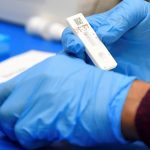The UK has recorded another 112,458 coronavirus cases in the latest 24-hour period, according to official data.
That compares to 92,368 cases on Monday – a sharp rise on Sunday’s figure because reinfections in England and Northern Ireland were included for the first time.
Data for Scotland and Wales will be added in the “days ahead”, the government website said.
A further 219 coronavirus-related deaths have been recorded in the UK – compared to 51 announced on Monday.
A reinfection is defined as someone who tests positive for COVID-19 more than 90 days after a previous infection.
Any positive tests within 90 days are said to be part of the same “infection episode”.
The arrival of the Omicron variant has made a difference, the UK Health Security Agency (UKHSA) said.
Reinfection rates averaged around 1.4% of cases until 16 November 2021, when a “spike in infections took place following the emergence of Omicron”, the UKHSA commented.
“Following that increase in the number of people infected, reinfections rose – with reinfections now representing around 10% of episodes per day.”
Professor Steven Riley, the UKHSA’s director general of data and analytics, said: “Reinfection remained at very low levels until the start of the Omicron wave. It is right that our daily reporting processes reflect how the virus has changed.”
A total of 37,342,083 people have now had a third or booster vaccine – equivalent to 64.9% of the population aged 12 and over.
Please use Chrome browser for a more accessible video player
Elsewhere, many countries have not reached their Omicron infection peak, the World Health Organisation (WHO) has said.
Its technical lead, Maria Van Kerkhove, said measures to curb the variant’s spread should be eased slowly.
The WHO’s emergencies chief, Mike Ryan, has urged countries to chart their own path out of the pandemic and not blindly follow others in relaxing measures.
“If you open doors quickly you better be able to close them pretty quickly as well,” he said.
And powerful immunity T cells – which are thought to play a role in long-term protection from serious COVID – are able to recognise Omicron, a study from the University of Cape Town in South Africa has found.
Omicron is known to evade the body’s antibody forces but experts have previously been unsure about the role of T cells in relation to the variant.






















